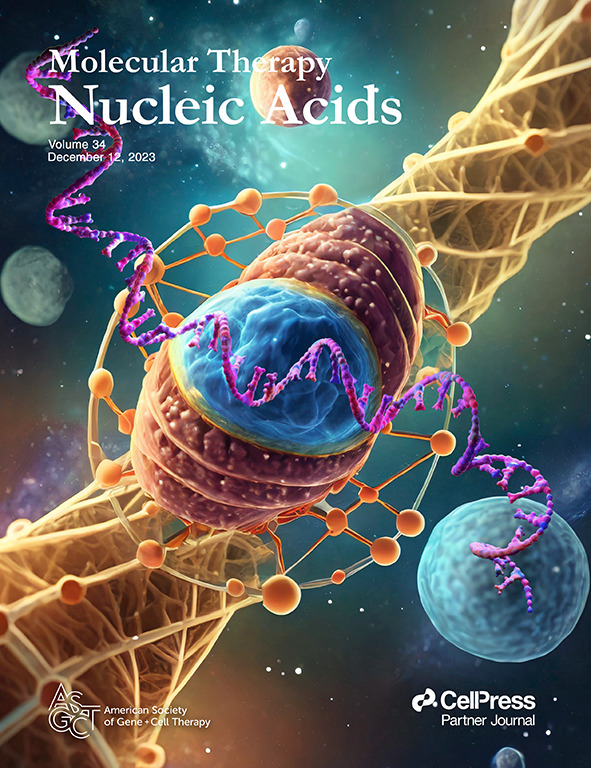RNA exon editing: Splicing the way to treat human diseases
IF 6.5
2区 医学
Q1 MEDICINE, RESEARCH & EXPERIMENTAL
引用次数: 0
Abstract
RNA exon editing is a therapeutic strategy for correcting disease-causing mutations by inducing -splicing between a synthetic RNA molecule and an endogenous pre-mRNA target, resulting in functionally restored mRNA and protein. This approach enables the replacement of exons at the kilobase scale, addresses multiple mutations with a single therapy, and maintains native gene expression without changes to DNA. For genes larger than 5 kb, RNA exon editors can be delivered in a single vector despite AAV capacity limitations because only mutated exons need to be replaced. While correcting mutations by -splicing has been previously demonstrated, prior attempts were hampered by low efficiency or lack of translation in preclinical models. Advances in synthetic biology, next-generation sequencing, and bioinformatics, with a deeper understanding of mechanisms controlling RNA splicing, have triggered a re-emergence of -splicing and the development of new RNA exon editing molecules for treating human disease, including the first application in a clinical trial (this study was registered at []). Here, we provide an overview of RNA splicing, the history of -splicing, previously reported therapeutic applications, and how modern advances are enabling the discovery of RNA exon editing molecules for genetic targets unable to be addressed by conventional gene therapy and gene editing approaches.RNA 外显子编辑:剪接治疗人类疾病的方法
RNA 外显子编辑是一种纠正致病突变的治疗策略,它通过诱导合成 RNA 分子与内源性前 mRNA 靶点之间的剪接,产生功能恢复的 mRNA 和蛋白质。这种方法可以在千碱基范围内替换外显子,用一种疗法解决多种突变,并在不改变 DNA 的情况下保持基因的原生表达。对于大于 5 kb 的基因,尽管 AAV 的容量有限,但 RNA 外显子编辑器仍可在单一载体中传递,因为只需替换突变的外显子。虽然以前已经证实过通过剪接来纠正突变,但以前的尝试因效率低或无法在临床前模型中转化而受阻。合成生物学、下一代测序和生物信息学的进步,以及对 RNA 剪接控制机制的深入了解,引发了-剪接的再次兴起,并开发出了用于治疗人类疾病的新型 RNA 外显子编辑分子,包括首次应用于临床试验(该研究已在[]注册)。在此,我们将概述 RNA 剪接、-剪接的历史、以前报道的治疗应用,以及现代技术的进步如何使 RNA 外显子编辑分子的发现成为可能,以治疗传统基因治疗和基因编辑方法无法解决的遗传靶点。
本文章由计算机程序翻译,如有差异,请以英文原文为准。
求助全文
约1分钟内获得全文
求助全文
来源期刊

Molecular Therapy. Nucleic Acids
MEDICINE, RESEARCH & EXPERIMENTAL-
CiteScore
15.40
自引率
1.10%
发文量
336
审稿时长
20 weeks
期刊介绍:
Molecular Therapy Nucleic Acids is an international, open-access journal that publishes high-quality research in nucleic-acid-based therapeutics to treat and correct genetic and acquired diseases. It is the official journal of the American Society of Gene & Cell Therapy and is built upon the success of Molecular Therapy. The journal focuses on gene- and oligonucleotide-based therapies and publishes peer-reviewed research, reviews, and commentaries. Its impact factor for 2022 is 8.8. The subject areas covered include the development of therapeutics based on nucleic acids and their derivatives, vector development for RNA-based therapeutics delivery, utilization of gene-modifying agents like Zn finger nucleases and triplex-forming oligonucleotides, pre-clinical target validation, safety and efficacy studies, and clinical trials.
 求助内容:
求助内容: 应助结果提醒方式:
应助结果提醒方式:


